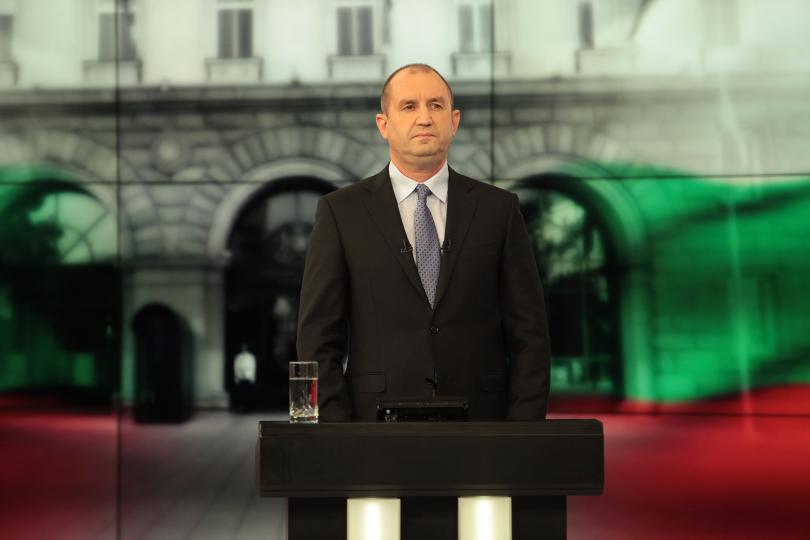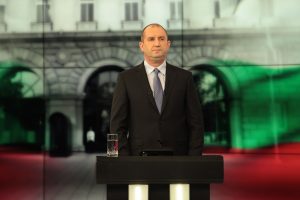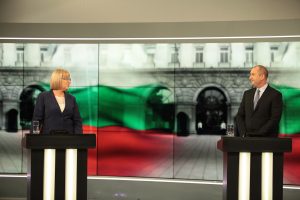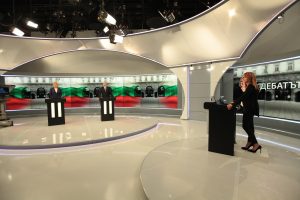The presidential debate between the two candidates who continue to the runoff has been opened. The socialists-backed candidate, Rumen Radev, and the candidate nominated by the main ruling party GERB, Tsetska Tsacheva, met for a final debate three...

The presidential debate between the two candidates who continue to the runoff has been opened.
The socialists-backed candidate, Rumen Radev, and the candidate nominated by the main ruling party GERB, Tsetska Tsacheva, met for a final debate three days before the second round of the presidential elections, which will be held on 13th of November.
The debate was hosted and aired by the Bulgarian National Television at 20:30 on 10th of November. BNT gave the two presidential candidates equal coverage.
 The first question concerned the date 10th of November on which Bulgaria marks 27th anniversary since the start of the democratic changes. To the question whether this 27 years brought hope or disappointment, Radev said “both”. He said he gave due weight to all democratic changes carried out in those years – Bulgaria’s membership in NATO and the European Union, the transition to democracy. “At the same time, however, we cannot fail to mention the disappointment in many Bulgarians and the feeling of despair,” he said and added that communism should not be used as an excuse for all failures in the modern days.
The first question concerned the date 10th of November on which Bulgaria marks 27th anniversary since the start of the democratic changes. To the question whether this 27 years brought hope or disappointment, Radev said “both”. He said he gave due weight to all democratic changes carried out in those years – Bulgaria’s membership in NATO and the European Union, the transition to democracy. “At the same time, however, we cannot fail to mention the disappointment in many Bulgarians and the feeling of despair,” he said and added that communism should not be used as an excuse for all failures in the modern days.
 Tsetska Tsacheva said that the past 27 years brought mostly hope, enthusiasm and upswing and added that Bulgaria returned to Europe and the Berlin wall fell a day before the start of the democratic changes in Bulgaria and the ousting of the communist regime. This, she said, enabled democratic processes - restored parliamentarism, free people in a free Europe, the rule of law, freedom of movement of capital and goods. At the same time, she said she felt sad that in Bulgaria things had not happened as in other Eastern European countries.
Tsetska Tsacheva said that the past 27 years brought mostly hope, enthusiasm and upswing and added that Bulgaria returned to Europe and the Berlin wall fell a day before the start of the democratic changes in Bulgaria and the ousting of the communist regime. This, she said, enabled democratic processes - restored parliamentarism, free people in a free Europe, the rule of law, freedom of movement of capital and goods. At the same time, she said she felt sad that in Bulgaria things had not happened as in other Eastern European countries.
To a question about what follows after the election of Donald Trump as President of the United States, Tsetska Tsacheva said Trump was the choice of the American citizens and "we should all respect this choice". She said that if elected as Bulgaria’s President she would work with Donald Trump. “I have less concerns now when the election campaign is over than during the campaign,” she added. She said that for her Hilary Clinton was more predictable, as well as for the European Union, while Donald Trump was a new face in the politics. In this sense, she said, she did not know anything else about him except what he stated in his pre-election campaign and that was the reason that at an earlier stage she had expressed reservations that not everything of what he said during the pre-election campaign would become fact during his governance.
“There always are risks in the modern world. And threats as well. But we have to use the opportunities this change brings,“ Radev said. “Donald Trump made serious messages during his campaign. They concerned his policy for reinvesting in the American economy. This will influence the relations with China and Europe, “ Radev noted.
He added that Bulgaria traditionally had good strategic relations with the USA and hoped the change of one person would not adversely affect the relations between Bulgaria and the USA. Just the opposite, he said, we should look for the new opportunities, Radev added.
To the question about what two issues they would raise in a possible future meeting with the US president Trump, Radev said that in the first place he would put security. He noted that Bulgaria should continue its cooperation with the United States in the area of defence and added that the country should seek partnership in the area of investments too, especially the state-of-the-art technologies.
Tsacheva said that Bulgaria and the USA were partners and allies in NATO and one of the issues would be security. She said she would also be putting the need for economic co-operation across the Atlantic Ocean.
Asked about two questions that they would put to Russia’s President Putin, Tsacheva said that she would say politely but firmly that Bulgaria conducted pragmatic policy which upheld its national interest. “I would invite him to visit Bulgaria to see the winter and summer resorts and the cultural and historic heritage which is also associated with the close relations between the Bulgarian and Russian people,” she said.
Radev said the Bulgaria’s relations with Russia should be placed on a clear pragmatic basis, ensuring economic cooperation and expanding of markets. He said that with Putin, he would talk about the spiritual bond between the two peoples and that it should continue. With Putin, Radev said he would discuss again projects in the area of energy.
Asked with which countries Bulgaria had the most complicated relations, Tsacheva said she would ask the question the other way and say these were the EU countries, the US, Russia and Turkey.
“Obviously, we have difficult relations with Turkey at the moment, “Radev said. Radev asked Tsacheva to comment on her dependencies on Turkey saying she won 12,000 votes there.
Tsacheva denied dependencies on Turkey and emphasized that GERB party worked with all Bulgarians citizens without dividing them by ethnicity or religion.
To the question whether Turkey was ready for EU membership now, Radev said it was definitely not adding that a number of accession criteria had not been met, especially in the area of human rights. Turkey had yet to meet 5 of the 72 conditions for the visa-free travel.
Tsacheva said what was happening in Turkey was important for Bulgaria. “My fear is that Turkey is getting farther from its accession to the EU,” she said.
Asked what should the Bulgarian policy on migrants be and which policy the two candidates supported - the one of Victor Orban or the policy of Angela Merkel, Tsacheva said that Bulgaria could not deal with the problem on its own, without the EU support. She highlighted that the government and the relevant institutions put the maximum efforts and explained that the fence facility at the border was built and only a small section, in the region of Bourgas was not finished yet.
Radev said that the government had put a lot of efforts but in the last months, not before that. He added that “we waited too long for Europe to come up with a common position”.
 The two argued about the price of the border fence and which government paid higher price for building this fence.
The two argued about the price of the border fence and which government paid higher price for building this fence.
To the question “What measures would the new president take if there was a wave of migrants at the southern border?”, Radev said he would convene the Consultative Council on National Security, identify the risks as quickly as possible, collect all the necessary information and make decisions. The government will put them into implementation.
Tsacheva said that here was no time to convene the Consultative Council and added that its decisions were only advisory. Her opinion was, that in the event of such situations, fast action would be needed by the competent authorities such as the border police, the army, and the new EU border and coast guard agency.
On the question: Will the increased defence budget make the Bulgarian army stronger?, Radev answered by saying that the increased budget was illusionary. The additional funds will be for social security contributions. There is a serious problem with the capacity of the Bulgarian armed forces. The personnel is demotivated and people leave; they are unequipped and unable to prepare adequately. The president should have a clear position on how to preserve the capability of the armed forces, he added.
Tsacheva said that If she was the President, she wouldn't endorse a budget without financing provided for modernization of the Land Forces. She added that the investments for the renovation and modernization of the armed forces for more than 25 years were not sufficient. The budget for 2017 is what we can afford but clearly we have to meet our commitments for an increase of up to 2% from the budget for Bulgaria, she said and added this would be achieved.
On the topic about Bulgaria’s judicial reform, Tsacheva said: “We have achieved a lot: Constitutional reform: changes to the judiciary. I hope the draft anticorruption law will go through by the end of the year on second reading.
Radev said that cosmetic changes in the judicial system did not mean an efficient fight against corruption. He said that if elected as President he would visit Romania to see what real judicial reform looked like. “I will invite representatives of the competent Romanian structures to visit and share experience about serious judicial reform. If I become President, I will insist on judicial reform, he noted.
On the question how the President can work to bring together a divided nation, Radev said that the Constitution provided for the President to be a unifier of the nation.
The vote of Bulgarian citizens gives him the strength to be a partner between the parties, between institutions, between civic associations, between citizens. The President must seek consensus, to be able to listen to all sides. The President must formulate goals to unite the nation, this is his main role, Radev commented.
We need a national doctrine to achieve continuity and unity. It is the President’s role to start a debate with the people, NGOs, political parties, on the preparation of a national doctrine, Tsetska Tsacheva said. This will make it clear that the direction of development of the country will not be diverted.
"I want to see an educated, wealthy, prosperous Bulgarian nation which lives in a stable and secure country with effectively working institutions, with respect between different religions, ethnic groups, citizens, no matter where they live and to forget hate speech, because we are all part of a unified Bulgarian nation and such we want to leave it to our children, " said Tsetska Tsacheva.
 In the final remarks of the debate, Radev said: “I think we are heading towards the future by looking backward. And striding backward, at every step we stumble. It is time to look ahead and look boldly into the future, striding forward. It is time to come together as a nation and end all divisions. This time Bulgarian people must make their own choice and elect a President who is capable of independent thinking and who will be a leader. “
In the final remarks of the debate, Radev said: “I think we are heading towards the future by looking backward. And striding backward, at every step we stumble. It is time to look ahead and look boldly into the future, striding forward. It is time to come together as a nation and end all divisions. This time Bulgarian people must make their own choice and elect a President who is capable of independent thinking and who will be a leader. “
“ I am heading to the President's office with my background as a lawyer, with the professional experience I gained and determinedness to not give up. Bulgaria must preserve its orientation. It belongs to Europe. We must work for the democratic values, the freedoms we have and must keep them, Tsacheva said.
photos by Dimitar Kyosemarliev for KRIPIX
 Паркирането в София - мисия невъзможна: Реакции за планираната "червена зона" и увеличението на цените
Паркирането в София - мисия невъзможна: Реакции за планираната "червена зона" и увеличението на цените